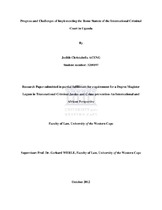| dc.contributor.advisor | Gerhard, Werle | |
| dc.contributor.author | Judith Christabella, Aceng | |
| dc.date.accessioned | 2014-11-06T10:42:05Z | |
| dc.date.available | 2014-11-06T10:42:05Z | |
| dc.date.issued | 2012 | |
| dc.identifier.uri | http://hdl.handle.net/11394/3811 | |
| dc.description | Magister Legum - LLM | en_US |
| dc.description.abstract | The coming into force of the Rome Statute of the International Criminal Court (hereafter “Rome Statute”) in July 20022 was a thriving success for the international community insofar as that it contributed greatly to international criminal law jurisprudence. The Rome Statute establishes the International Criminal Court (hereafter “ICC”) and confers upon the ICC jurisdiction over the international crimes namely: the crime of Genocide; Crimes against Humanity; War Crimes and the Crime of Aggression. However, the execution of the Courts mandate is rather based two core principles that the Court operates on: the Principle of Complementarity, and the Principle of Cooperation. The principle of complementarity is to the effect that the jurisdiction of the ICC to prosecute those most responsible for committing international core crimes is subsidiary to that of national jurisdictions. | |
| dc.language.iso | en | en_US |
| dc.subject | Challenges | en_US |
| dc.subject | Complementarity | en_US |
| dc.subject | Implementation | en_US |
| dc.subject | International core crimes | en_US |
| dc.subject | International Criminal Court | en_US |
| dc.subject | International Criminal Court Act | en_US |
| dc.subject | Prosecution | en_US |
| dc.subject | Rome statute | en_US |
| dc.subject | State party | en_US |
| dc.subject | Uganda | en_US |
| dc.title | Progress and challenges of implementing the Rome statute of the international criminal court in Uganda | en_US |
| dc.type | Thesis | en_US |

